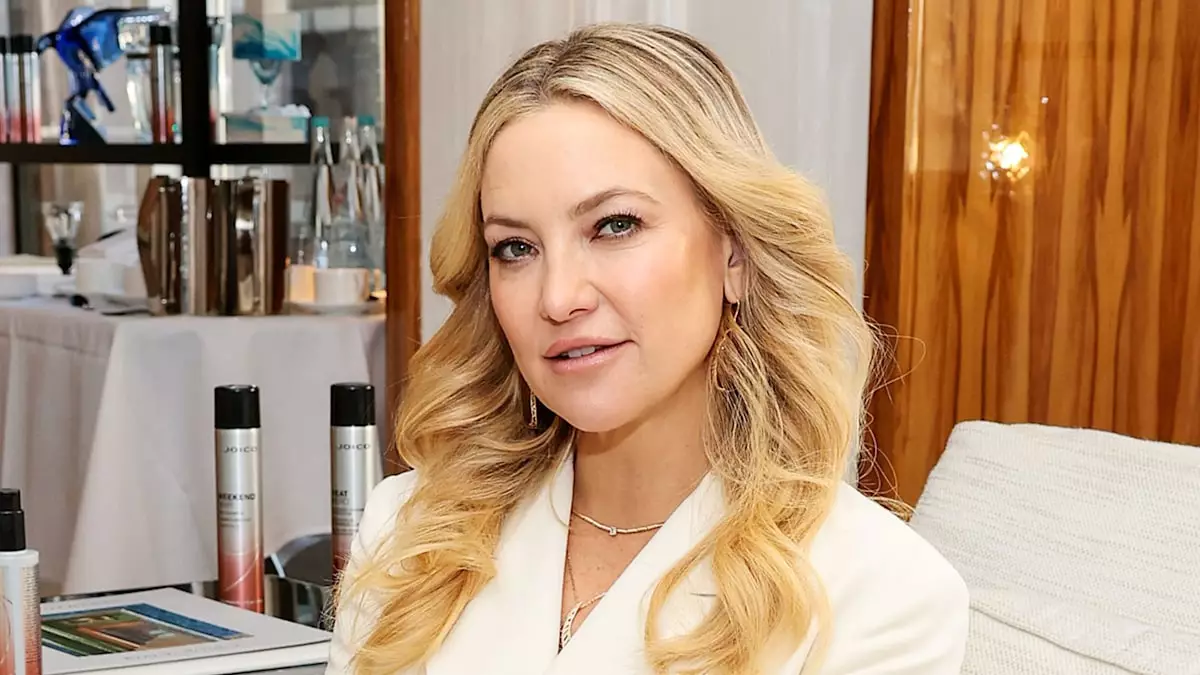Actress Kate Hudson has long captivated audiences not only with her on-screen performances but also with her intriguing familial dynamics. Recently, through a heartfelt dialogue with her co-star Kathryn Hahn, Hudson peeled back the layers of her relationships with her brothers, Oliver Hudson and Wyatt Russell. Her reflections reveal a deeper commentary on sisterhood, sibling support, and the intrinsic need for validation within familial ties. The candidness of Hudson’s revelations paints a vivid picture of the unique bond she shares with her brothers while also highlighting a universally relatable desire for acceptance and acknowledgment.
Unlike the typical narrative of tight-knit families, Hudson’s experience of being the only girl among her siblings creates a distinct dynamic. In her latest Netflix series, Running Point, her character Isla embodies the challenges of navigating relationships without the female counterpart typically present in sibling dynamics. “I wish I had a sister,” Hudson expressed, candidly addressing a common longing that may resonate with many women who have grown up in similar family structures. The absence of a sister figure serves not only as a potential void in Hudson’s life but as a pivotal element that shapes her interactions with her brothers. She reveals a compelling drive to be seen as capable and competent within her family unit, continually striving for a recognition of her abilities amidst the sibling rivalry and dynamics often present in larger families.
Seeking Validation and Competence
Hudson’s poignant assertion that she wants to be seen as “competent” echoes her character’s journey in Running Point, creating an emotional thread that ties together her artistic choices and her personal experiences. It’s fascinating to consider how Hudson interprets competence not just as a personal trait but as a need for affirmation from her brothers. This yearning for acknowledgment speaks to a broader theme observed in many relationships; people often seek external validation from those closest to them. In Hudson’s case, her brothers’ acknowledgment holds significant weight, underlining a foundational belief in herself and her capabilities.
This sentiment resonates strongly within Hollywood’s competitive environment, where the struggle for recognition can often overshadow artistic merit. Hudson’s ability to navigate this landscape while maintaining close familial ties speaks volumes about her resilience and dedication; it also reflects a necessary balancing act in the pursuit of personal fulfillment and public validation.
Transformative Experiences and Growth
During her conversation with Hahn, Hudson expressed the profound effects of the COVID-19 pandemic on her outlook towards life and her career. The pandemic catalyzed a moment of introspection, prompting her to confront unfulfilled aspirations. “What am I putting out there?” she candidly questioned, a reflection that many individuals find themselves pondering in times of crisis. This self-dialogue not only highlights Hudson’s vulnerability but also her commitment to living authentically and boldly.
The heartfelt comments from her co-star, who lauded Hudson’s courage to evolve from acting to exploring music, dovetail neatly into Hudson’s overarching narrative of courage. It is not merely about succeeding in a particular avenue of art but about daring to pivot when necessary—something that exemplifies true artistry. “If I don’t have the courage to do something that I love, what are my kids going to think?” Hudson’s reflection reveals a dual responsibility: to herself and to her children. She conveys a deep desire to model fearlessness and resilience for the next generation, showcasing the impact of personal choices on familial relationships.
The Courage to Change
Hudson’s journey exemplifies a broader movement in which many artists are redefining the boundaries of their careers. The conversation she shared with Hahn underscores a common ethos among creative individuals: the relentless pursuit of growth and innovation. Hudson’s courage to shift directions in her career and explore various artistic avenues serves as an inspiration to many, particularly women. Her openness in discussing fears and aspirations offers a refreshing perspective, reminding us that vulnerability can lead to empowerment.
Moreover, Hudson’s emphasis on the importance of personal fulfillment—contrasted against societal expectations—encourages us to reconsider our own life choices. The lingering question of “What truly matters?” becomes a guiding principle not just for Hudson’s artistry but as a universal reflection for all navigating their paths in life. With her brothers cheering her on amidst the complexities of their sibling bond, Hudson stands as a testament to the power of familial love, personal courage, and the unyielding quest for authenticity in the arts.

